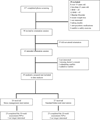A comparison of a behavioral weight loss program to a stress management program: A pilot randomized controlled trial
- PMID: 27138110
- PMCID: PMC4877253
- DOI: 10.1016/j.nut.2016.01.008
A comparison of a behavioral weight loss program to a stress management program: A pilot randomized controlled trial
Abstract
Objectives: This study compared a behavioral weight loss program (BWL) with a stress management-based program, Emotional Brain Training (EBT), on weight loss, blood pressure, depression, perceived stress, diet, and physical activity.
Methods: Subjects with a body mass index (BMI) of >28 and <45 kg/m(2) were recruited in Lexington, Kentucky in January 2014 and randomized to BWL or EBT for a 20-week intervention. Of those recruited, 49 participants were randomized to EBT or BWL. Randomization and allocation to group were performed using SPSS software. Weight, blood pressure, depression, perceived stress, dietary intake, and physical activity were measured at baseline, 10 week, and 20 week. Linear models for change over time were fit to calculate 95% confidence intervals of intervention effects.
Results: BWL produced greater changes in BMI than EBT at both 10 (P = 0.02) and 20 wk (P = 0.03). At 10 wk, both EBT and BWL improved BMI, systolic blood pressure, depression and perceived stress (P < 0.05). BWL also improved diastolic blood pressure (P = 0.005). At 20 wk, EBT maintained improvements in BMI, systolic blood pressure, depression, and perceived stress while BWL maintained improvements only in BMI and depression (P < 0.05).
Conclusions: BWL produced greater weight loss than EBT; however, EBT produced sustained improvements in stress, depression, and systolic blood pressure. A combination of the two approaches should be explored.
Keywords: Adult; Depression; Obesity; Stress management; Weight loss.
Copyright © 2016 Elsevier Inc. All rights reserved.
Figures
Similar articles
-
Pilot Investigation of 2 Nondiet Approaches to Improve Weight and Health.Altern Ther Health Med. 2018 Jan;24(1):16-20. Altern Ther Health Med. 2018. PMID: 28646804 Clinical Trial.
-
Combining behavioral weight loss treatment and a commercial program: a randomized clinical trial.Obesity (Silver Spring). 2013 Apr;21(4):673-80. doi: 10.1002/oby.20044. Obesity (Silver Spring). 2013. PMID: 23404824 Free PMC article. Clinical Trial.
-
Rationale and study protocol for a randomized controlled trial to determine the effectiveness of a culturally relevant, stress management enhanced behavioral weight loss intervention on weight loss outcomes of black women.BMC Public Health. 2022 Jan 28;22(1):193. doi: 10.1186/s12889-022-12519-z. BMC Public Health. 2022. PMID: 35090433 Free PMC article.
-
Conventional weight loss interventions across the different BMI obesity classes: A systematic review and quantitative comparative analysis.Eur Eat Disord Rev. 2020 Sep;28(5):492-512. doi: 10.1002/erv.2741. Epub 2020 May 3. Eur Eat Disord Rev. 2020. PMID: 32363695
-
Which components of behavioral weight management programs are essential for weight loss in people living with obesity? A rapid review of systematic reviews.Obes Rev. 2024 Oct;25(10):e13798. doi: 10.1111/obr.13798. Epub 2024 Jul 1. Obes Rev. 2024. PMID: 38952041 Review.
Cited by
-
The impact of adult behavioural weight management interventions on mental health: A systematic review and meta-analysis.Obes Rev. 2021 Apr;22(4):e13150. doi: 10.1111/obr.13150. Epub 2020 Oct 25. Obes Rev. 2021. PMID: 33103340 Free PMC article.
-
Depression and obesity among females, are sex specificities considered?Arch Womens Ment Health. 2021 Dec;24(6):851-866. doi: 10.1007/s00737-021-01123-6. Epub 2021 Apr 20. Arch Womens Ment Health. 2021. PMID: 33880649
-
College Freshmen Students' Perspectives on Weight Gain Prevention in the Digital Age: Web-Based Survey.JMIR Public Health Surveill. 2017 Oct 12;3(4):e71. doi: 10.2196/publichealth.7875. JMIR Public Health Surveill. 2017. PMID: 29025698 Free PMC article.
-
Effectiveness and Components of Health Behavior Interventions on Increasing Physical Activity Among Healthy Young and Middle-Aged Adults: A Systematic Review with Meta-Analyses.Behav Sci (Basel). 2024 Dec 19;14(12):1224. doi: 10.3390/bs14121224. Behav Sci (Basel). 2024. PMID: 39767365 Free PMC article. Review.
-
Impact of adult weight management interventions on mental health: a systematic review and meta-analysis protocol.BMJ Open. 2020 Jan 20;10(1):e031857. doi: 10.1136/bmjopen-2019-031857. BMJ Open. 2020. PMID: 31964665 Free PMC article.
References
-
- Boero N. All the News that's Fat to Print: The American "Obesity Epidemic" and Media. Quantitative Sociology. 2007;30:41–60.
-
- LaRosa J. U.S. Weigh Loss Market Worth $60.9 Billion. 2011, Marketdata Enterprises. PRWeb
-
- Centers for Disease Control and Prevention. Health, United States, 2013. Centers for Disease Control and Prevention. [cited 2015 August 6]; Available from: http://www.cdc.gov/nchs/fastats/obesity-overweight.htm.
-
- Dunkley AJ, et al. Diabetes prevention in the real world: effectiveness of pragmatic lifestyle interventions for the prevention of type 2 diabetes and of the impact of adherence to guideline recommendations: a systematic review and meta-analysis. Diabetes Care. 2014;37(4):922–933. - PubMed
-
- Wadden TA, et al. Efficacy of lifestyle modification for long-term weight control. Obes Res. 2004;12(Suppl):151S–162S. - PubMed
Publication types
MeSH terms
Grants and funding
LinkOut - more resources
Full Text Sources
Other Literature Sources
Medical


